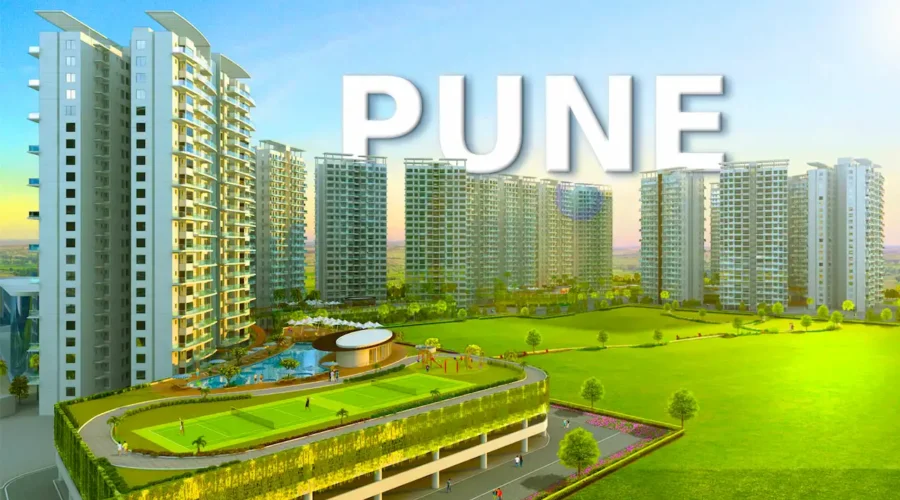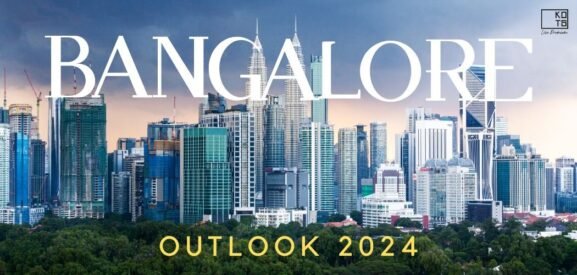Real Estate Investment in Pune
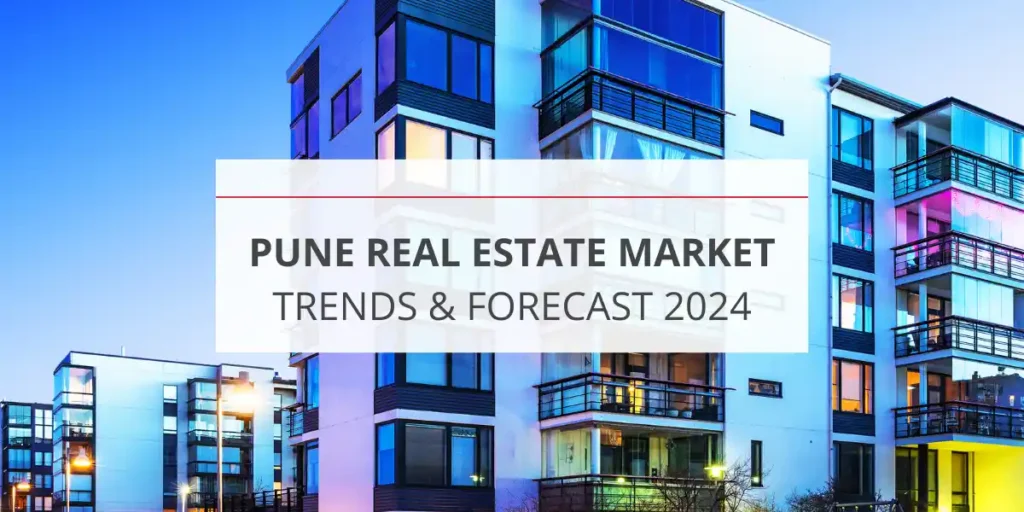

Maharashtra government’s stamp duty collections in Pune for March 2024 marked a 30% YoY increase at ₹804 crore from ₹621 crore in March 2023.
As many as 21,744 properties were registered in Pune in March 2024, resulting in a 52% increase compared to 14,309 in the previous year. Stamp duty collections during this period totaled ₹804 crore, marking a 30% year-on-year (YoY) rise, according to Maharashtra government’s department of Registrations and Stamps (IGR). Stamp duty collections recorded in March 2023 stood at ₹621 crore.
Increase in purchase of properties worth more than ₹1 crore in March 2024
In March 2024, registration of residential units priced between ₹50 lakh and ₹1 crore constituted the highest proportion, accounting for 33% of all housing transactions. Similarly, properties priced between ₹25 lakh and ₹50 lakh represented 32% of the market share. The share of properties under ₹25 lakh has also witnessed a notable increase from 16% in March 2023 to 21% in March 2024, an analysis by Knight Frank showed. The higher value segment, comprising properties priced ₹1 crore and above, witnessed an increase in its market share. This category’s share rose from 10% in March 2023 to 13% in March 2024, indicating a growing preference for properties in this price range, it showed.
Higher demand for larger apartments
In March 2024, apartments ranging from 500 to 800 sq ft commanded a significant market share of 40%. Similarly, apartments with an area under 500 sq ft also attracted considerable interest, comprising 35% of transactions in March 2024, positioning it as the second most preferred apartment size. The market share of larger apartments, exceeding 1000 sq ft, remained stable at 13% during this period, it showed.
Pricing Trends in Different Areas
The pricing landscape in Pune exhibits a contrast, with premium areas experiencing higher appreciation compared to the outskirts & suburbs. Established neighbourhoods like Koregaon Park, Kothrud, Kalyani Nagar, and Baner continue to command premium prices due to their proximity to business centres, educational institutions, and recreational hubs.
On the other hand, upcoming areas like Hinjewadi and Wagholi offer more affordable options, catering to the burgeoning demand from the IT workforce and young professionals. The overall market is marked by a discerning buyer base, with preferences leaning towards well-connected locales with robust social infrastructure.
Types of Housing in Demand
While compact living spaces in apartments remain popular among the urban workforce, there is a noticeable uptick in demand for villas and townhouses. This trend is fuelled by an evolving mindset that places a premium on spacious, independent living, often coupled with amenities that enhance the overall lifestyle experience.
Commercial Sector

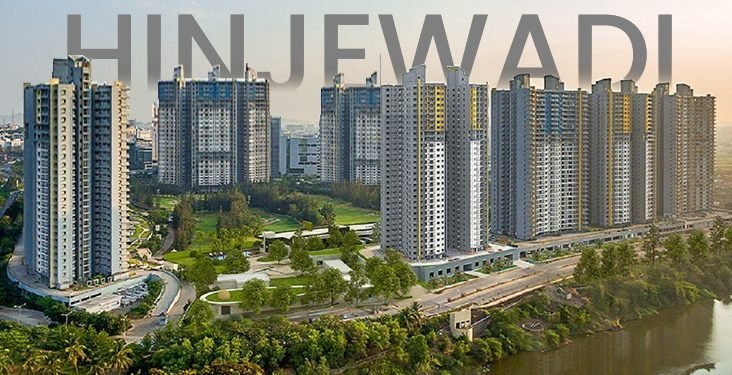
Office Space Demand and Vacancy Rates
The city’s burgeoning IT and startup ecosystem, coupled with a pro-business environment, has increased commercial real estate requirements. However, the supply has been sufficient, and the vacancy rates remain stable. Corporate giants, technology firms, and startups actively seek office spaces in areas like Magarpatta, Hadapsar, and Hinjewadi, contributing to the city’s status as a prominent business destination.
Emerging Business Districts and Commercial Hubs
Pune’s commercial landscape is shifting, with emerging business districts gaining prominence. Areas like Pimpri-Chinchwad, Baner, and Wakad are evolving into commercial hubs, attracting businesses seeking alternatives to the traditional central business districts. This decentralisation is driven by improved connectivity, available infrastructure, and a desire for more collaborative and flexible workspaces.
Rental Trends and Lease Rates
Rental trends in Pune’s commercial sector reflect the evolving nature of work. Flexible workspaces, co-working facilities, and serviced offices are gaining traction – offering businesses the agility and cost-effectiveness they seek. Lease rates, while competitive, vary across different business districts, and their pricing structure is influenced by proximity to transport nodes & amenities.
Influencing Factors on Pune’s Real Estate Market
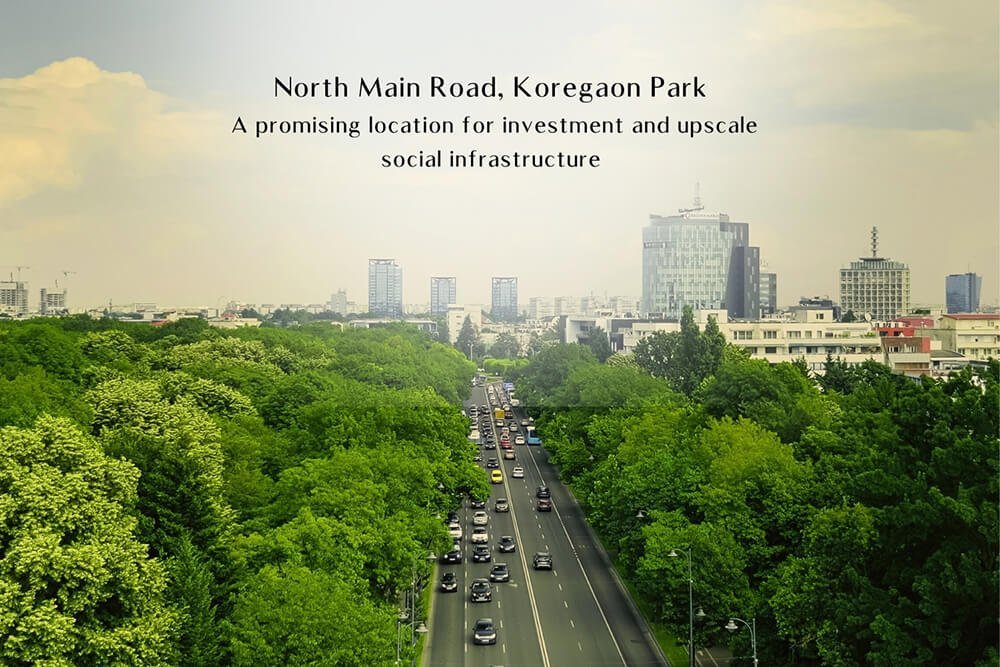
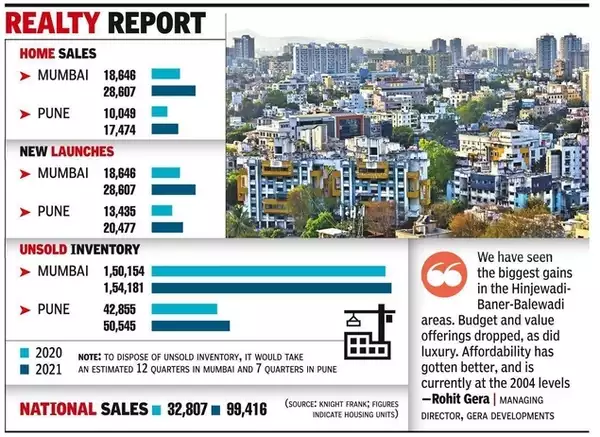
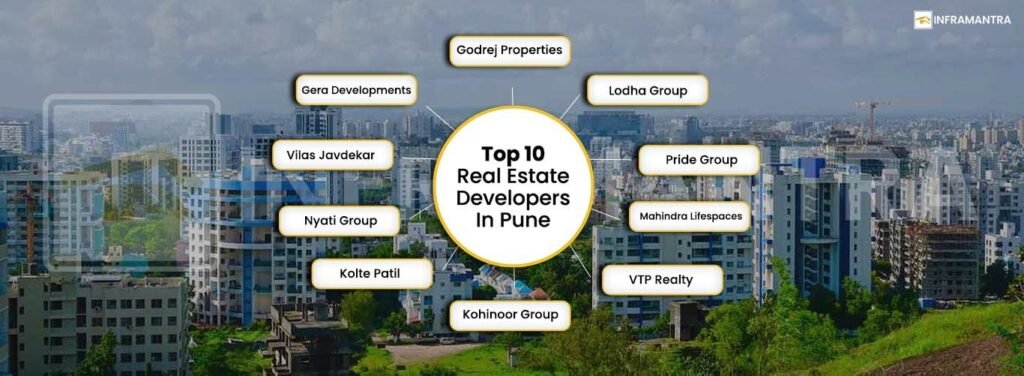
- Infrastructure Developments:Pune’s real estate market is intricately linked to the city’s ongoing and planned infrastructure developments. The expansion of transportation networks – such as the Pune Metro and improved road connectivity – plays a pivotal role in shaping property trends. Areas witnessing significant infrastructural upgrades experience increased demand, as improved accessibility enhances the overall appeal for residential & commercial growth.
- Economic Indicators:Job creation, GDP growth, & industrial development directly impact Pune’s real estate landscape. The Pune real estate market is closely tied to the economic prosperity of the city, and its status as a thriving IT & manufacturing hub. Job opportunities attract a steady influx of migrants, driving the demand for residential properties.
- Government Policies and Regulations:These play a pivotal role in shaping the real estate market in Pune. Regulatory frameworks related to land acquisition, environmental clearances, and construction permits can facilitate or impede development. Policies promoting affordable housing or incentivising sustainable practices can also influence the types of projects developers undertake.
Pune Real Estate Market Forecast 2025
Pune Residential Market Trends & Forecast
- Micro-Market Analysis:This reveals nuanced trends within Pune’s residential sector. As of 2025, established neighbourhoods such as Kothrud, Koregaon Park, Kalyani Nagar, and Baner are expected to witness sustained demand driven by their proximity to business centres, educational institutions, and recreational amenities. These areas are likely to maintain their premium status, with a focus on luxury and high-end developments. In contrast, emerging suburbs like Hinjewadi and Wagholi are poised for substantial growth.
- Forecast for 2025:The forecast for Pune’s residential market 2025 anticipates a continued demand-supply gap, potentially leading to a moderate upward trend in property prices. Affordable housing segments are expected to dominate the market, driven by government initiatives and real estate developers’ strategy to cater to the middle-income segment.
- Impact of External Factors:Economic changes and government policies will be crucial in shaping Pune’s residential market. Positive economic indicators, including job growth and GDP expansion, can boost consumer confidence and drive housing demand. Inversely, economic downturns may lead to a temporary slowdown in the market.
Pune Commercial Real Estate Trends and Forecast 2025
- Emerging Business Districts:Pune’s commercial real estate landscape is witnessing a shift towards emerging business districts. Areas such as Pimpri-Chinchwad, Baner, and Wakad are evolving into significant commercial hubs. This decentralisation is driven by improved connectivity, the availability of quality office spaces, and a desire for more collaborative and flexible workspaces.
- Forecast for 2025:The forecast for Pune’s commercial real estate market in 2025 predicts a sustained demand for office spaces driven by the city’s thriving IT and startup ecosystem. The growth trajectory is expected to continue, with businesses actively seeking modern, flexible, and tech-enabled workspaces. Co-working spaces and serviced offices will likely gain prominence, catering to companies looking for agility and cost-effective solutions.
Pune Real Estate Investment Opportunities and Challenges
Potential Hotspots for Investment
High-Growth Areas:
- Hinjewadi: IT hub with consistent demand
- Kothrud: Strategic location, ongoing developments
- Baner: Emerging residential and commercial hotspot
- Pimpri-Chinchwad: Industrial growth and infrastructure
- Undri: Proximity to IT hubs & upcoming projects
Investment Attractiveness Factors
- Infrastructure: Areas with ongoing or planned infrastructure projects, such as metro lines, improved roads, and connectivity enhancements, attract investors looking for long-term growth
- Employment Opportunities: Proximity to job hubs, business districts, and IT parks significantly contributes to the attractiveness of an area for real estate investment
- Social Infrastructure: The presence of quality schools, healthcare facilities, and recreational amenities enhances the liveability of an area – making it more appealing to potential homebuyers and tenants
- Affordability: Areas offering a range of affordable housing options will likely attract a diverse pool of investors, especially considering the increasing demand for budget-friendly properties
Risks and Challenges:
Market Volatility and Uncertainties:
- Economic Factors: Pune’s real estate market is susceptible to economic fluctuations. Market uncertainties, changes in consumer confidence, and economic downturns can impact property prices and investment returns.
- Global Events: External factors such as geopolitical events, global economic conditions, or health crises (as seen with the COVID-19 pandemic) can introduce unpredictability and affect investor sentiment.
Regulatory Risks and Policy Changes:
- Approval Delays: Regulatory hurdles and delays in project approvals can affect the timely execution of real estate projects, potentially impacting returns on investment
- Policy Changes: Shifts in government policies, including tax reforms and regulatory amendments, can impact the overall real estate landscape. Investors should stay updated and adapt accordingly.
Future Trends and Innovations in the Pune Real Estate Market
- Technology Integration:
The integration of smart home technologies is becoming increasingly prevalent in Pune. There is a growing interest in properties with automation features, such as intelligent lighting, security systems, and climate control. PropTech innovations include the usage of VR and AR for virtual property tours, allowing buyers to explore properties remotely. This technology is reshaping the way real estate is marketed and experienced. - Sustainable Development:Eco-friendly construction practices are becoming common in Pune’s real estate. Builders are adopting energy-efficient designs – incorporating features like solar panels, rainwater harvesting, and energy-efficient appliances to reduce environmental impact. The demand for homes with green spaces, eco-friendly materials, and sustainable amenities reflects a growing awareness of environmental responsibility among Pune’s homebuyers.
Final Thoughts
The future of the real estate market in Pune points towards rapid adaptation to change, increased technological integration, and sustainable development. The rise of smart homes has ushered in a new era of convenience and efficiency for homeowners.
Pune’s real estate developers are harnessing the power of automation to create residences that seamlessly blend technology with everyday living. Be it intelligent lighting that adapts to moods or security systems that keep us connected, the era of smart homes is truly upon us.
In parallel, the PropTech revolution is redefining how we buy, sell, and experience real estate in Pune. Virtual and augmented reality are breaking down geographical barriers, allowing potential buyers to explore properties from the comfort of their homes.
Homebuyers in Pune are increasingly aligning their preferences with eco-conscious choices. The demand for sustainable properties, from green spaces to energy-efficient appliances, reflects a collective awareness of our environmental footprint. It is more than a trend; it is a shift towards responsible living and recognising the long-term benefits of investing in eco-friendly homes.
As we conclude this exploration of the future of the Pune real estate market, the city is not just building structures but creating experiences. Pune’s real estate journey is a testament to its resilience and adaptability, embracing a future where innovation and sustainability go hand in hand, building homes that are not just spaces but reflections of a progressive and eco-conscious community.
The luxury housing market of Pune is currently going through some very fantastic trends. The price per sq ft for luxury homes in Pune will definitely touch Rs 15,000 per sq ft at prime locations across the city by 2025, which was pegged at Rs 12,000 per sq ft in 2023. Ultra-luxury property prices could go up to as high as Rs 25,000 per sq ft in places such as Koregaon Park. 55% of the luxury home buyers in Pune are below 40 years now, states a JLL India report, with 30% comprising NRIs or expatriates. Demand for global standard amenities surpasses supply accordingly.
The average size of luxury apartments in Pune has surged from 2,500 sq. ft in 2023 to 3,200 sq. ft now. The supply is likely to double by 2025, while demand for 4 BHK and larger configurations has risen by 40% since 2023. More tie-ups between prime luxury real estate developers and global lifestyle brands are in the works, and at least 5 new branded residences projects are slated to be launched in Pune by 2025.
While the prospects of Pune’s luxury housing market seem considerably bright, there are challenges that plan to test them. The upcoming or emerging luxury hotspots rely on infrastructure projects like the Pune Metro in time for its completion. Ensuring water management solutions for sustainable living becomes relevant as 80 percent of the luxury projects now come equipped with advanced water conservation systems. Another concern is traffic congestion, which recently saw developers offering shuttle services and work from home-friendly designs to deal with it.
This would open a flood of opportunities to the developer community, matching their offerings to the changing buyer preferences. Most likely, a 15-20% premium would be at hand for projects focusing on holistic well-being. In that case, the absorption rate may be about 30% faster for eco-friendly luxury developments, while demand for luxury projects featuring innovative in-home automation and security systems may go up by 25%.
Fast-forward to 2025, and Pune is going to take this leap of transformation by way of luxury housing. It will be through the conflict of technology, sustainability, and experience that the definition of luxury shall now be rewritten for the Queen City. With its strong economic growth, rich cultural heritage, and changing urban landscape, Pune would emerge as truly one of the leading destinations of luxury real estate within India. The innovative, far-seeing developers and investors who can navigate this shifting paradigm are likely to reap significant rewards in this ascending market.

